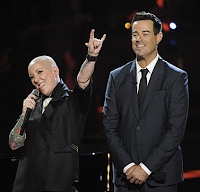As though she weren't delightful enough already, Megan Draper, Don Draper's second wife on "Mad Men," won a special place in my heart this last week by introducing her husband to the Beatles song "Tomorrow Never Knows." Appropriately, the 40-year old Don pulled the needle off the record halfway through the song, which he surely found incomprehensible. According to the New York Times, this was a Major Moment in television history:
Aside from songs that have been played in the occasional commercial or the Beatles cartoon series that was shown on ABC in the 1960s, the use of “Tomorrow Never Knows” on “Mad Men” is probably one of the only times that a Beatles track has been used in a TV show, music and advertising executives say.
Jeff Jones, the head of Apple Corps, the Beatles’ company, wrote in an e-mail on Monday that it was the first such license in the five years he has been with the group, although he said he could not be sure about earlier uses that predate his time at the company. Mr. Weiner said he was told that it was the only time a Beatles song has been in a television show, other than the band’s live performances.I have a strong memory of hearing a few seconds of a Beatles song, possibly "I Want to Hold your Hand," playing on Col. Raynor Sarnac's clock radio on an episode of "Call to Glory." I have no idea if this was historically accurate -- whether clock radios existed at the time that could wake people up to music, whether a middle-aged Air Force colonel would be listening to a station that played the Beatles in 1963, etc. -- but I'm pretty sure it happened on TV, nearly 30 years ago. Can anyone back me up on this?
 |
| Yeah, that's Elisabeth Shue. |



